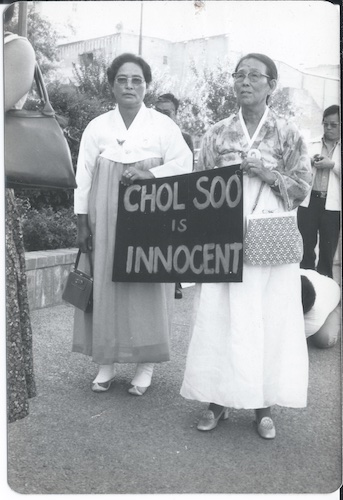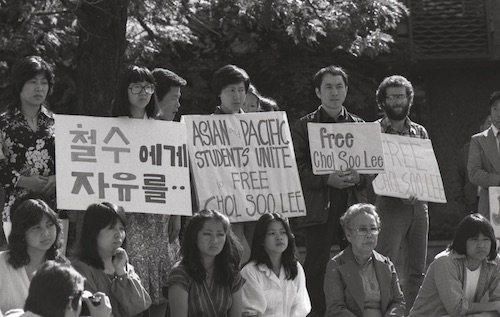Communiqué
Set free after 10 years in prison, he found himself in a new fight on “Free Chol Soo Lee” on INDEPENDENT LENS – April 24
< < Back to set-free-after-10-years-in-prison-now-finding-himself-in-a-new-fight-free-chol-soo-lee-on-independent-lens-april-24NEW DOCUMENTARY “FREE CHOL SOO LEE” TELLS THE STORY OF AKOREAN IMMIGRANT WRONGFULLY
CONVICTED OF MURDER AND THE PAN–ASIAN SOCIAL JUSTICE MOVEMENT HE INSPIRED,
PREMIERING ON PBS’S INDEPENDENT LENS APRIL 24, 2023
The Critically–Acclaimed Film Shines a Light on a Little–Known Chapter of Asian American History, Featuring Interviews with Journalist K.W. Lee, Activist Ranko Yamada, and More
Directed by journalists and filmmakers Julie Ha and Eugene Yi, “Free Chol Soo Lee” tells the rollercoaster life story of Chol Soo Lee, a Korean immigrant wrongfully convicted of murder in San Francisco in the 1970s, and the Pan–Asian American grassroots movement for justice he inspired. The film makes its broadcast debut on INDEPENDENT LENS, April 24, 2023, at 10:00 p.m. ET, and will also be available to stream on the PBS Video app.

In 1973, Chol Soo Lee was arrested for the gang–related murder of Yip Yee Tak, a Chinese American man who had been shot to death in San Francisco’s Chinatown. Following a flawed investigation, which leaned on the eyewitness testimony of three white tourists, and no interviews with members of the localChinatown community, Lee was wrongfully convicted of the murder and sentenced to life in prison. Four years into serving his sentence in Tracy, California, Lee got into an altercation with another inmate, Morrison Needham, that ended with Lee killing him in what he claimed was an act of self–defense.
Around this time, a Korean American journalist named K.W. Lee began investigating the case and wrote a series of stories that revealed the police investigation’s missteps and the racism that was evident throughout the process in their racial profiling and stereotyping of Lee. The articles helped spark a nationwide grassroots movement among numerous Asian American groups, leading to the formation of a Pan–Asian American defense committee, and a national and global coalition of activists and allies rallying for Lee’s release. As the documentary captures, the movement marked a seminal moment for a historic, national pan–Asian coalition that brought together immigrant and American–born Asians in a common cause for justice and freedom for Chol Soo Lee.
Thanks to their mobilization efforts, the activists were able to raise funds to hire defense attorneys for Lee and a retrial of the Chinatown murder was held in 1982, resulting in Lee’s acquittal. The following year, Lee’s death sentence for the Needham stabbing was also nullified, and he was ultimately released from prison in March of 1983.
The documentary continues to trace Lee’s life after his release, chronicling his struggles with unemployment and addiction, which culminated in an arson job in 1991 which went awry, leaving Lee with third–degree burns on his body. Following his injury, he started speaking at schools and youth centers on the issues of mass incarceration, and the importance of extending humanity and compassion to others—as people did for him. At the age of 62, Lee passed away in San Francisco in 2014, from complications related to his arson injuries.

“Free Chol Soo Lee” pulls heavily from a trove of archival footage and documents kept by the activists, including K.W. Lee himself, and features interviews with those most closely involved in the movement: K.W. Lee (who was a mentor to the film’s co–director Julie Ha in her own journalism career), Chol Soo Lee’s friend and activist Ranko Yamada, and others. Through its
careful telling of Lee’s life story, it sheds light on a little–known period in Asian American history and the legacy of the movement to free Chol Soo Lee—one that remains ever timely and relevant, as recent years have seen a drastic uptick in violence against Asian Americans since the onset of the coronavirus pandemic.
“‘Free Chol Soo Lee’ tells the story of a significant moment in not only Asian American history, but also in American history. And yet it was little known and at risk of staying buried in history. We could not let that happen,” said filmmakers Julie Ha and Eugene Yi. “Chol Soo Lee was no model minority when a group of people took up his cause. He was a poor immigrant kid with a criminal record, and yet he inspired a landmark nationwide movement that boldly fought for his freedom and for justice. We hope the film’s home on INDEPENDENT LENS will ensure that Chol Soo Lee’s story lives on, and that the legacy of the movement carries forward, inspiring new generations of activists, journalists, and people of conscience to work toward creating a more just society for all.”

